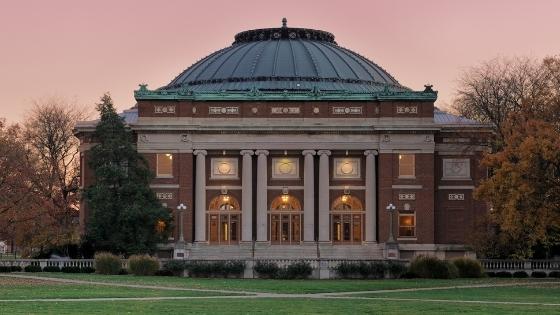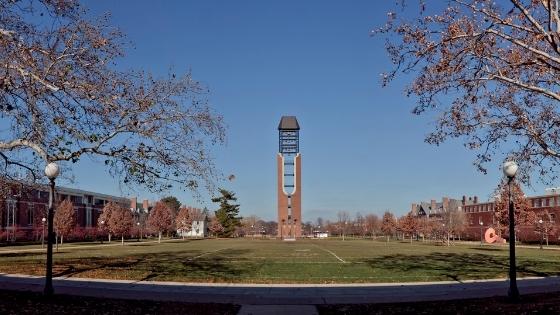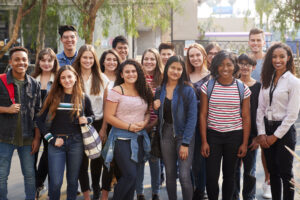The University of Illinois at Urbana-Champaign (or UIUC for short), is the top public university in Illinois, and one of the best public schools in the country. Its engineering program is especially commended, and it is this program we will discuss today.
While the bulk of UIUC’s pupils come from within Illinois, students from across the country and around the world head to the university to study. Many prospective students wonder what UIUC can offer them, and if it’s worth applying. In this article, we’ll bring you inside UIUC’s engineering program, and give you a glimpse of what the school brings to the table. We don’t have the time to cover everything, so instead, we’ll dive deeply into three programs: Mechanical Science and Engineering, Aerospace Engineering, and Computer Science.
We’re doing this using videos put out by the programs themselves. While these videos are quite informative, their length can be difficult to fit in for busy high school students. We hope that by summarizing their contents for you here, you are able to apply to college with confidence. Let’s jump in!
Mechanical Science and Engineering (MechSE)
The MechSE program is a large one, with 1,000 students at any given time. Around 20% of the program is female, and 17% are international students. There is a graduate program attached as well, with pathways to proceed directly into graduate study for advanced undergraduates.
All students in the program work towards a BS degree. The foundations are similar to the rest of engineering; including lots of math and mechanics. Indeed, so many math classes are required that you can earn a math minor with only two additional courses. Many of the courses have lab requirements, as some concepts require a hands-on approach. All students within the MechSE program must major in either Mechanical Engineering (ME) or Engineering Mechanics (EM).
It can be difficult or slightly easier to double major depending on the majors in question, and the amount of overlap between them. Since UIUC is willing to accept a lot of AP credit and count it towards gen-ed requirements, having a lot of AP credits will help you, double major.
Research labs are abundant at UIUC, and there are many opportunities for undergraduates to get involved: earning course credit, doing work-study jobs, or volunteering to help with research. While lab opportunities are not guaranteed, they are available. Seniors often complete a senior design project and make use of the various design and fabrication labs on campus.
There are MechSE specific study abroad programs, which allow you to continue fulfilling course requirements while studying abroad. The school also has a partnership with Zhejiang University joint institute (ZJUI) in Haining, China, which caters specifically to engineering students.
In order to become a professional engineer, you must pass a certification exam, much as lawyers must pass the bar. This is the Fundamentals of Engineering (FE) exam, which UIUC program graduates boast a 100% pass rate on.
There are a number of student organizations devoted to engineering as well, both social and technical. You aren’t required to participate in these, but participating in engineering competition teams can allow you to earn course credit.

Aerospace Engineering
There are around 500 undergrads in this department, and they admit a bit over 150 students each admissions cycle. Between 15-20% of students in the program are international students. Students complete a core curriculum with some elective choice, with many students also pursuing minors or majors, in either technical or nontechnical fields.
The first two years of the program are focused on engineering basics, while the junior and senior years focus on aerospace specifically. All aerospace students take A-100 in their freshman year, which is an introduction to aerospace engineering and is a project-based course involving building and launching model rockets. Other intro courses include calculus, physics, and general education requirements.
Incoming freshmen meet with advisors during the summer to go over the credit they have coming in and to take placement exams for the calculus, physics, and chemistry courses. These measure your background knowledge and determine which courses you will take freshman year.
The sophomore year focuses more on engineering basics, with most courses shared among all engineering students. Your junior year begins the basics of aerospace, including fluid dynamics, materials, and dynamics. In senior year comes the application of your knowledge. This includes a senior design course, which is a two-semester project-based course. There is also a separate senior design competition. You further get to pick your technical electives senior year and specialize in your area of focus.
The most common second major is in Economics. For students interested in business, there is a joint program between the colleges of business and engineering. This focuses on solving real-world problems, with teams of students in each class coming up with solutions for technical issues raised by companies.
For study abroad, there are faculty-led programs, summer abroad, and semester abroad options. Aerospace-specific options include a faculty-led program in South Africa, a summer program in France, and a number of highly flexible options for a semester abroad, depending on where you want to study and who UIUC has partnered with.
There are numerous research opportunities, including UROP (Undergraduate Research Opportunity Program), which is a 10-week summer research internship, where you work with a faculty member in their lab. If you are interested in doing research you should reach out to faculty early; there are technical elective credits you can earn by working in faculty labs during your junior and senior years. This is especially recommended if you intend to pursue graduate school.
There are a number of student organizations devoted to aerospace, some of which are social in focus, others more technical. The more social ones are for networking, while technical ones include rocketry, model aircraft, and various competition-focused design clubs.

Computer Science
While the main CS program is run through the Grainger College of Engineering, there are further CS programs run through other colleges by the same department, including Liberal Arts and Sciences, Agriculture, and Fine Arts. All CS programs are incredibly competitive for admissions and are quite popular.
CS Engineering must be declared as your first choice major when you apply; there is no option to declare it as a second choice major. The CS programs in other colleges must be declared when applying as well. They do not recommend transferring in from undecided; it is more competitive to transfer in than to get in by applying directly.
Promoting Undergraduate Research in Engineering (PURE) serves to connect undergraduates with research opportunities throughout the engineering department. This is meant primarily for freshmen students, to introduce them to faculty looking for research assistants. Summer research projects and internships are also available. International students have additional rules they must follow for engineering research, especially in security, cryptography, and defense fields.
Grainger Engineering City Scholars (GECS) is a program open to CS and Electrical Engineering students. It is a semester-long program where students take classes at the University of Illinois at Chicago, do research, and complete a paid internship. This is a competitive program that occurs each semester; generally, students apply for it in their third year.
There are many RSOs with a focus on computer science, some of which are social, and focus on building professional networks, while others are technical, and focus on projects. Hack Illinois is also sponsored by the department.
The school also works with industry partners, sponsoring talks, career fairs, and networking events. These often lead to recruiting of students right out of undergrad. Many of the recruiters at these events and fairs are alumni of UIUC.
Final Thoughts
Engineering programs are quite competitive at colleges across the country, and the best programs are the most competitive. We hope that this guide to UIUC’s program will help you better understand your options, and allow you to apply with confidence. If you want more information on UIUC generally, check out our fact sheet.
If you are looking for the best major for you, or want help applying to a competitive engineering program, you should schedule a free consultation with us. We have a depth of experience and have helped students get into top engineering schools across the country, from MIT to UT’s own Cockrell School.








